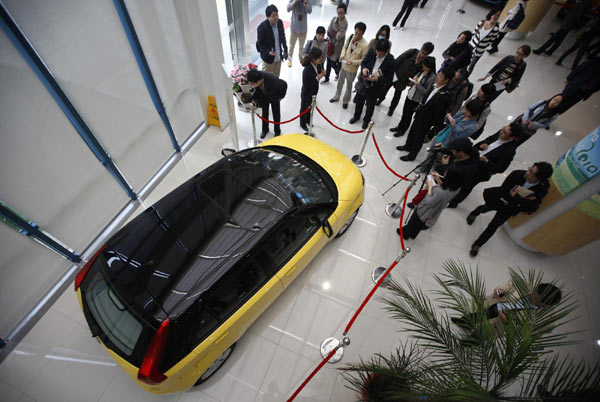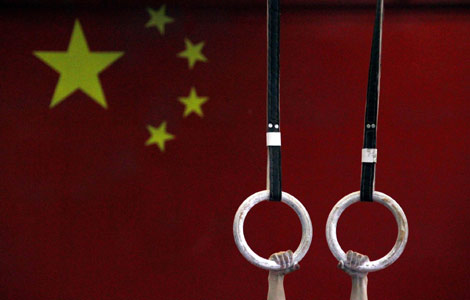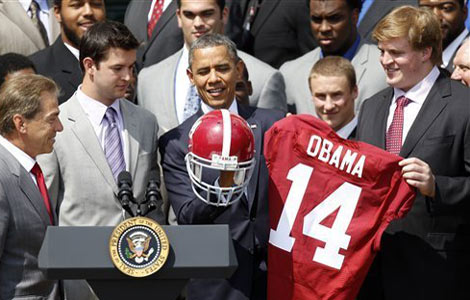 |
|
|
|
|||||||||
Automakers are bringing SUVs and luxury sedans designed for Chinese buyers to China's biggest auto show this year as they scramble to keep sales growing amid a slump in this giant market's once-explosive demand.
 |
|
Visitors look at a model of a MG3 car on display at an automobile factory of SAIC Motor in Shanghai, April 20, 2012. Car sales in China in March climbed a modest 4.5 percent from a year earlier, pulling back sharply from a hefty gain in February, as a slowing economy and higher fuel prices kept customers away from showrooms. [Photo/Agencies] |
Sales growth in the world's biggest auto market plunged from an eye-popping 35 percent in 2010 to just 2.5 percent last year as China's economy slowed. That is forecast to rebound to about 5 percent this year — stronger than the United States or Europe but a challenge for automakers that added new assembly lines during the boom, leading to a glut of supplies.
General Motors, Honda, BMW and other global brands, as well as ambitious Chinese rivals such as Chery and Geely, are wooing Chinese buyers hard at Auto China 2012, which opens next week. World premieres are planned for three Ford SUVs, a Fiat 500 co-designed with fashion house Gucci and a Range Rover styled by designer Victoria Beckham.
Automakers that used to sell the same models in every market with few changes for local tastes are creating models tailored for Chinese buyers.
As competition heats up, foreign car makers that have invested billions in China are seemingly unfazed by the recent slowdown in sales. Ford on Thursday announced plans for a $760 million factory in the eastern city of Hangzhou that along with an earlier announced expansion in Chongqing will double its China production capacity to 1.2 million vehicles a year.
Companies such as Ford expect to continue benefiting from Chinese preferences for foreign car brands. They also expect the market to get much bigger in the years ahead. Even with 30 million cars on the road, China still has just 28 vehicles for every 1,000 people, far below the US level of 800. Some 80 percent of purchases are by first-time buyers.
"You have a lot of potential demand for many years to come," said Michael Dunne, president of Dunne & Co., a Hong Kong-based industry researcher.
China passed the United States in 2009 in number of vehicles sold, and sales last year totaled 18.5 million vehicles. The country is the biggest market for automakers from giants General Motors Co. and Volkswagen to specialized producers such as Rolls Royce, owned by BMW AG. It is a pillar of the turnaround effort by struggling Nissan Motor Co., which announced an $8 billion China expansion plan last year.
Automakers expect annual sales in China to rise to 30 million vehicles by 2020. Several hope to double their own sales from 2011 levels by 2015.
But right now, automakers that added assembly lines in the 2009-10 boom are being squeezed by weaker demand as China's rapid economic growth slows and Beijing enforces lending curbs to control inflation.
"They weren't planning on single-digit growth last year or this year," Dunne said. "In the short term, look for some automakers to come under pressure as the gap between capacity and actual demand increases."
That might be good news for China's legions of aspiring first-time car buyers. Analysts say the excess capacity may force some manufactures to cut prices.
General Motors, China's biggest auto brand with 2011 sales of 2.5 million vehicles, says it expects to boost sales 7 to 10 percent this year, outpacing the market.
The company says it expects to increase production capacity by another 25 percent in 2012-13. GM says it will release more than 60 new and upgraded models by 2015 and wants to double annual sales to 5 million vehicles.
"We are well positioned to capitalize on the market growth," GM said in a statement.
This week, GM's Holden unit in Australia announced it will develop at least two vehicles for China with Shanghai GM, a joint venture between General Motors Co. and state-owned Shanghai Automotive Industries Corp.
Honda Motor Co. says it will bring to China at least 10 new and updated models in 2013-2015 and strengthen services to provide customized vehicles.
Honda suffered a 10 percent decline in sales in the first three months of this year from a year earlier. The company blamed lack of production capacity to meet demand for popular small-engine cars. Honda plans to open its second China factory in July.
"Honda will focus on compact cars and accelerate its pace in introducing new products designed for the Chinese market," said a Honda spokeswoman, Xia Gao.
Automakers who have made most of their money in big cities on China's prosperous east coast are expanding into lower-income but populous inland areas, which they see as the basis of future growth.
Nissan is targeting economically priced cars at lower-income cities while it also tries to sell high-end models, said a Nissan China spokesman, Sharon Shen.
Defying the overall slowdown, Nissan posted a 22 percent increase in sales in China last year to 1.2 million cars. The country has become Nissan's largest market, accounting for about 27 percent of global sales.
Shen says Nissan expects double-digit growth for 2012.
Global automakers have kept sales growing by taking market share from Chinese producers, but local rivals Chery Automobile Corp., Geely Holding Group and BYD are fighting back by promoting new features and services.
Chinese customers are getting choosier about design and colors, said a BYD spokeswoman, Veronica Jiang.
"BYD will focus on post-sale services, improve quality and continue to innovate to meet the changing demands in the market," Jiang said.
Geely plans to show 21 vehicles at Auto China.
In November, Chery and an Israeli partner, Israel Corp., launched a new brand, Qoros Automotive Co., with ambitions to become one of China's first automakers to meet stringent European safety standards.
At the luxury end of the market, growth has slowed but producers report double-digit gains.
Daimler AG's Mercedes-Benz reports its best quarter ever this year, with sales in the January-March period up 24 percent over a year earlier at 54,720 units. Growth was driven by its premier S-Class.

|

|

|

|

|

|